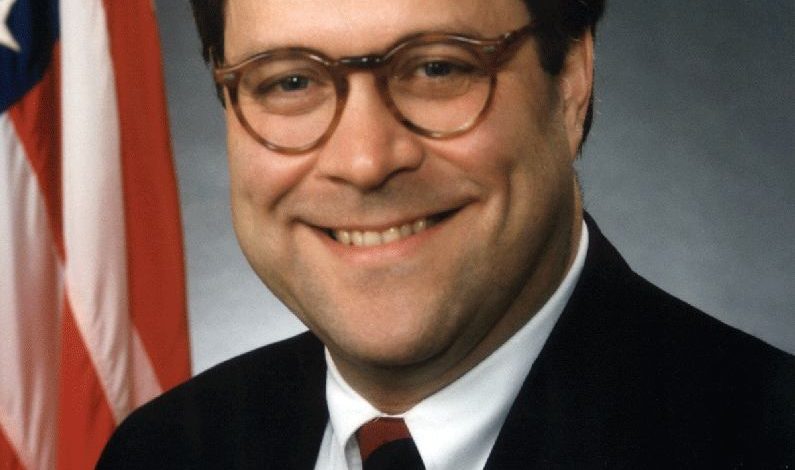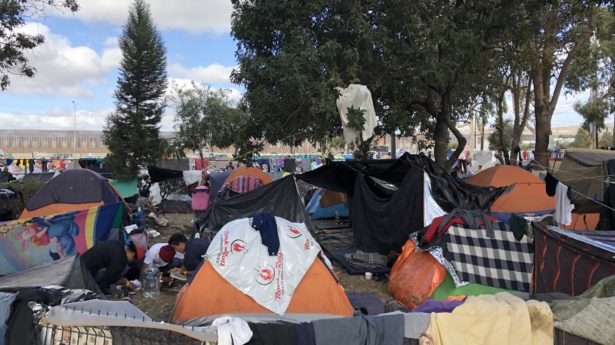The Unitarian Universalist Service Committee advances human rights through grassroots collaborations.
Troubling Echoes of the Past in Trump’s Attorney General Pick

By on December 12, 2018
Last Friday, President Trump announced his preferred selection to head the Justice Department, William P. Barr, who served as Attorney General under the first Bush administration. Barr would take the place of former AG Jeff Sessions, who left a particularly abysmal record on human rights during his time in office, crafting policies that separated families at the border and restricted avenues for asylum. If Barr is confirmed as Attorney General, he must do a better job than his predecessor of upholding the United States’ human rights obligations.
What we have learned in recent days of Barr’s past, however, is not encouraging. Barr’s record during his previous tenure in office reveal a contempt for international law and the human rights of asylum-seekers – two warning signs that are particularly disturbing in the context of an administration that is currently pursuing multiple tactics to foreclose the right to seek asylum at the U.S.-Mexico border.
While he was serving as deputy Attorney General and Attorney General from 1990-93, Barr played a major role in efforts to expand incarceration and mobilize the U.S. military in domestic law enforcement contexts—efforts that align with the Trump administration’s attempts to expand funding for immigration detention and to send troops to the U.S.-Mexico border. Such policies threaten to compromise a number of human rights protections—including the fundamental right not to suffer arbitrary violence or loss of freedom at the hands of the state.
No less troubling, Barr was a key proponent in the Justice Department of the first Bush administration’s policy of using the U.S. Coast Guard to block Haitian refugees from reaching the United States—a violation of their internationally-protected right to seek asylum.
During the first Bush administration, thousands of Haitian refugees fled the country due to political persecution and violence following the 1991 military coup against Haiti’s first democratically elected president, Jean-Bertrand Aristide. The coup was carried out in part by an intelligence service created by the U.S. Central Intelligence Agency (CIA) in 1986, while Bush was serving as Vice President. By the time of the coup, according to the New York Times in 1993, this CIA-sponsored unit had effectively become “an instrument of political terror.”
Instead of offering a chance to seek asylum to people who had been displaced in part by their own policies, U.S. officials adopted a policy of intercepting refugees at sea and forcibly returning them to Haiti, in violation of international law. Under legal pressure, the U.S. government eventually began detaining Haitian refugees at the Guantanamo Bay Naval Base instead, where they were in theory screened for asylum needs, but without access to lawyers, and without being offered access to U.S. territory.
In an oral history given to the Miller Center of the University of Virginia in 2001, William Barr recounted with evident pleasure his role in these human rights violations:
There was one incident that one of my former aides is constantly reminding me about because it was sort of a funny scene. We were stopping Haitian boat people as soon as they came out of Haiti. We intercepted them on the high seas and turned them around and put them back into Haiti, because we viewed them as economic refugees, not political refugees. So this judge up in New York kept on putting stays on us and actually enjoining the Coast Guard and the Justice Department out on the high seas, claiming we were violating different things. […]
Brent Scowcroft [National Security Advisor] called me and said, When are you going to get that thing lifted? […] I said, My backup plan is that if we can’t get the stay done, we put our ships within the three-mile limit of Haiti and stop the boats within the three-mile limit, and then we’ll put them back on shore. There was this long silence.
I said, You see, that way we wouldn’t be violating the High Seas Act. And he said, But that would violate international law, wouldn’t it? And I said, Yes, but it wouldn’t violate American law. [laughter]
If confirmed, Barr will join an administration that is actively pursuing efforts to block asylum-seekers from Central America, in ways that are frighteningly analogous to the policies of the first Bush administration.
Currently, President Trump is attempting to negotiate a policy known as “Remain in Mexico,” which in theory would force asylum-seekers to wait south of the U.S-Mexico border while their cases are processed. In addition to leaving people stranded in a country that is often not safe for migrants, such a policy would violate the U.S.’s legal obligation to (in the words of UN experts) “grant individuals seeking international protection access to [its] territory and to fair and efficient asylum procedures.” This is a form of illegal pushback very similar to what was done to Haitian refugees in the early 1990s.
In such a context, Barr’s demonstrated contempt for international law suggests that he may be a willing accomplice in such unlawful and immoral practices.
UUSC calls on Barr to explicitly disavow this legacy and pledge to uphold the internationally protected right to seek asylum on U.S. territory. We demand that any nominee for U.S. Attorney General commit themselves to defending the rights of all people in their jurisdiction, including courageous asylum-seekers who have fled violence and persecution in order to assert their human right to survive.
Photo Credit: DOJ, via Wikimedia Commons

